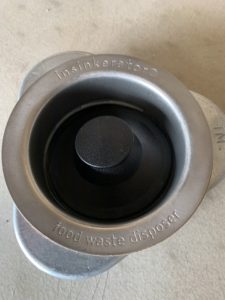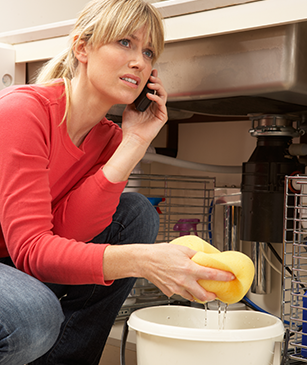Easy-to-Follow Instructions for Repairing a Leaky Waste Disposal
Easy-to-Follow Instructions for Repairing a Leaky Waste Disposal
Blog Article
The article which follows on the subject of The Handy Guide To Fixing Your Garbage Disposal Leaking is truly motivating. Give it a try and make your own personal ideas.

Waste disposal unit are essential kitchen appliances that assist in taking care of food waste successfully. However, a leaking garbage disposal can be an aggravating and untidy issue to take care of. Thankfully, several leakages can be taken care of quickly with a couple of easy actions. In this article, we will certainly discuss how to repair a dripping waste disposal unit successfully.
Intro
Garbage disposals are set up under kitchen area sinks and are made to shred food waste into smaller pieces, enabling it to go through the pipes system conveniently. While these tools are generally trustworthy, leakages can take place with time as a result of damage, loosened links, or damages to the unit.
Usual Sources Of Leaks in Rubbish Disposals
Worn Seals and Gaskets
Seals and gaskets play a critical duty in protecting against water from dripping out of the garbage disposal. In time, these elements can weaken, resulting in leaks around the disposal system.
Loose Links
The links between the waste disposal unit and the plumbing system can become loosened over time, creating water to leakage out during operation.
Cracks or Openings in the Disposal Device
Physical damages to the waste disposal unit, such as cracks or openings in the real estate, can also lead to leaks.
Identifying the Resource of the Leakage
Before trying to fix a dripping garbage disposal, it is necessary to determine the resource of the leakage. This can commonly be done via visual inspection or by conducting straightforward tests.
Visual Examination
Check the garbage disposal unit meticulously for any type of signs of water leak. Pay close attention to locations around seals, gaskets, and connection factors.
Testing for Leakages
One way to examine for leaks is by running water with the disposal device and checking for any kind of visible indications of leakage.
Devices and Materials Needed for Fixing a Dripping Waste Disposal Unit
Prior to beginning the repair work process, collect the essential devices and materials, including a screwdriver, adjustable wrench, plumbing's putty, substitute seals or gaskets, and epoxy or patching product for repairing splits or openings.
Step-by-Step Guide to Dealing With a Leaking Waste Disposal Unit
Shut off the Power
Prior to attempting any kind of repair services, guarantee that the power to the garbage disposal system is turned off to stop the danger of electrical shock.
Locate the Leakage
Identify the specific location of the leak and figure out the cause.
Tighten up Connections
Use a wrench to tighten any type of loosened connections in between the disposal device and the plumbing system.
Replace Seals or Gaskets
If the leakage is because of used seals or gaskets, get rid of the old parts and replace them with new ones.
Patching Splits or Holes
For splits or holes in the disposal system, usage epoxy or an ideal patching material to seal the broken location.
Examining the Garbage Disposal After Repair Work
As soon as the fixing is total, check the garbage disposal by running water through it to ensure that the leak has actually been dealt with.
Preventive Maintenance Tips to Stay Clear Of Future Leakages
To prevent future leakages, it is essential to carry out regular upkeep on your waste disposal unit. This includes keeping it clean, avoiding placing non-food products or hard things down the disposal, and regularly checking for leakages or other concerns.
Final thought
To conclude, repairing a dripping garbage disposal is a relatively straightforward procedure that can be completed with standard devices and products. By complying with the actions outlined in this article and exercising precautionary maintenance, you can maintain your garbage disposal in good working problem and avoid costly repair work in the future.
HERE’S HOW TO FIX YOUR GARBAGE DISPOSAL
WHAT TO DO IF SOMETHING IS STUCK IN YOUR GARBAGE DISPOSAL
If the impeller won’t turn, there’s probably something stuck in the disposal. It could be a steak bone or peach pit, although plumbers report pulling all sorts of inappropriate objects out of disposals, such as bottle caps or aluminum foil. Make sure power to the disposal is off, and look inside to see if you can see the source of the jam.
Never stick your fingers in a disposal. Pull out anything you see with tongs or pliers.
If the disposal still won’t work, it may be time to call a plumber or consider buying a new disposal. GEM Plumbing & Heating is here for all of your garbage disposal needs.
WHAT TO DO IF YOUR GARBAGE DISPOSAL DRAIN IS CLOGGED
Take everything out from underneath your sink and put a bucket or other container under your disposal to catch any water that drains out. Disconnect your disposal from the power supply. If it’s plugged into a wall outlet, unplug it. If it’s hardwired into an electrical box, go to the electrical panel and turn off the breaker for the disposal. Pour ¼ cup of baking soda into the drain, followed by ½ cup of white vinegar. Give the solution a few minutes to fizz and do its work. Look into the disposal with a flashlight to see if you can see an object that might be causing the clog. If you see it, remove it using tongs or pliers. MORE TIPS ON DEALING WITH A CLOGGED GARBAGE DISPOSAL
Never use drain cleaner in a garbage disposal. It can damage the plastic parts inside the disposal. You can also be splashed with the caustic liquid while working to clear the clog. Beware! Never stick your fingers into a garbage disposal. Trust us — not a good idea. In many instances, your dishwasher drains through your garbage disposal. This allows the disposal to grind any large food particles that may be drained out of your dishwasher. There are some jurisdictions, however, where the plumbing code prohibits such a connection. WHAT TO DO WHEN YOUR DISHWASHER DRAINS THROUGH THE DISPOSAL
Run some water in the sink so your plunger has at least a ½-inch of water to create a seal and plunge vigorously up and down several times. You may need to repeat this several times. Run hot water down the drain to clear any residue that remains.

I am just very intrigued by Why Is and I'm hoping you appreciated our blog post. Sharing is good. You never know, you could be helping someone out. I cherish reading our article about Tips on Fixing a Leaking Garbage Disposal.
Book-Now Report this page